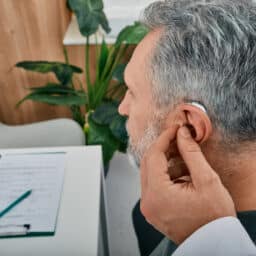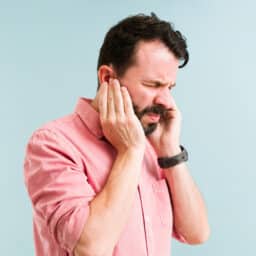What To Know About High-Frequency Hearing Loss in Children

High-frequency hearing loss is difficulty in hearing high-pitched sounds. It’s typically caused by damage to the hair cells in the inner ear and often leads to difficulty in understanding fast speech. It can occur at any age and is most common among older adults. However, one study showed as many as 14.2% of children within…
What To Know About Temporal Bone Tumors

Tumor can be an upsetting word. Hearing your provider say “tumor” is probably enough to cause stress and maybe even a little perspiration. While feeling stressed is very normal, taking a second to learn about the multiple different types of temporal bone tumors and treatments is an excellent way to calm your nerves surrounding the…
How Are Multiple Sclerosis and Hearing Loss Connected?

Multiple Sclerosis (MS) is an autoimmune disease in which the immune system attacks the myelin, or protective covering, of the brain, spinal cord and eyes. As a result, those with MS experience symptoms like muscle pain and weakness and problems with cognitive ability and memory. The disease progresses with remissions and relapses. Approximately 2 million…
Is Notch Therapy an Effective Management Option for Tinnitus?

Hearing a ringing or buzzing noise that you can’t attribute to an external source is likely a sign that you’re experiencing tinnitus. Affecting approximately 10% of the U.S. adult population, tinnitus can have a significant impact on your life. A few adverse effects of tinnitus may include but are not limited to: Stress and anxiety…
How Hearing Aids Improve Your Social Connections

Hearing loss can often have an adverse effect on the relationships in our lives. A survey by Cochlear Americas found that 35% of respondents with hearing loss felt that their romantic partner suffered most due to their condition, followed closely by family, friends and coworkers. Treating your loss with hearing aids can be a great…
Can Hearing Aids Make Watching TV Easier?

Hearing loss is a common chronic condition that affects millions of Americans. Data tells us that nearly 30 million adults in the U.S. could benefit from using hearing aids. Hearing aids make all aspects of life easier. They can help you follow along during important work meetings, enjoy dinner out with your family at Fowler…
Why Does Hearing Loss Make You Tired?

It’s not a surprise that hearing loss can cause you to turn up the volume louder when you watch TV or struggle to follow conversations when you’re out in busy environments like Three Fisherman Seafood Restaurant. However, did you know that untreated hearing loss can also make you feel more tired? Hearing Loss and Mental…
Tips for Managing Your Hearing Loss at Work

Hearing loss can make it challenging to participate fully at work. Following conversations in person, over video or phone call can feel challenging and may leave you exhausted. Approximately 15% of U.S. adults experience some trouble hearing. Know that you aren’t alone, and there are accommodations you can make to minimize the adverse effects of…
Childhood Nutrition Can Impact Hearing Loss

It’s not a secret that good nutrition is essential to a person’s overall health and well-being, both as a child and an adult. Research has shown that poor nutrition in childhood may increase a person’s chances of developing hearing loss as an adult. Study Links Poor Childhood Nutrition to Hearing Loss in Adulthood Researchers at…
What Does It Mean if You Have Low-Frequency Hearing Loss?

Most people with hearing loss struggle with high-frequency sounds, such as birds chirping or children talking, first. However, some people have a less common form of hearing loss known as low-frequency hearing loss. What Is It? Low-frequency hearing loss means that you have a reduced ability to hear lower-pitched sounds. It is also referred to…
